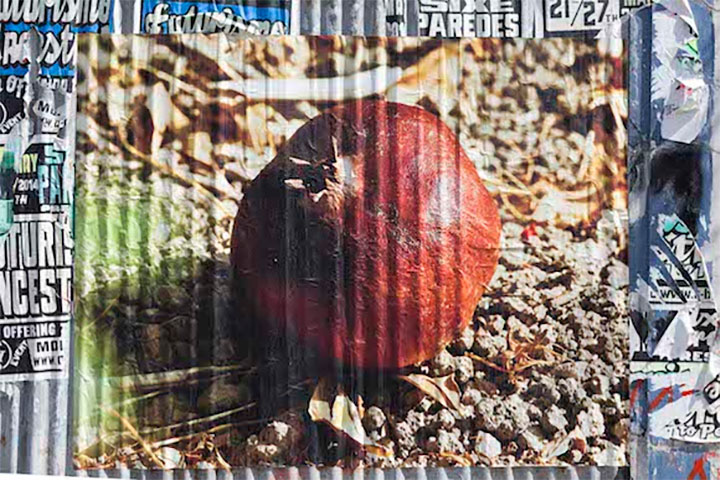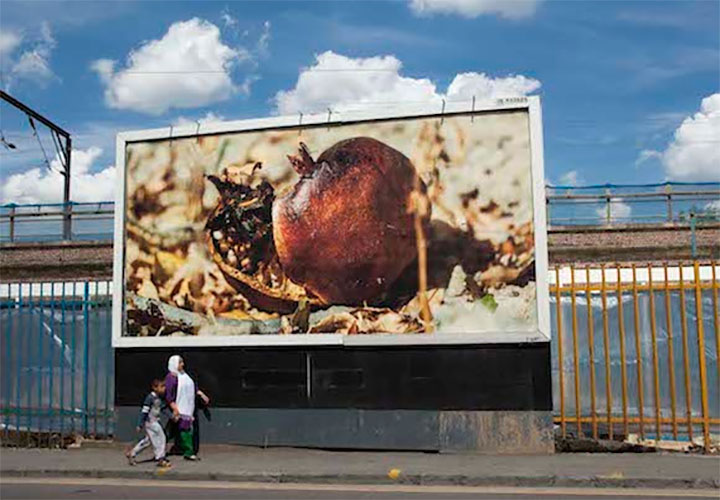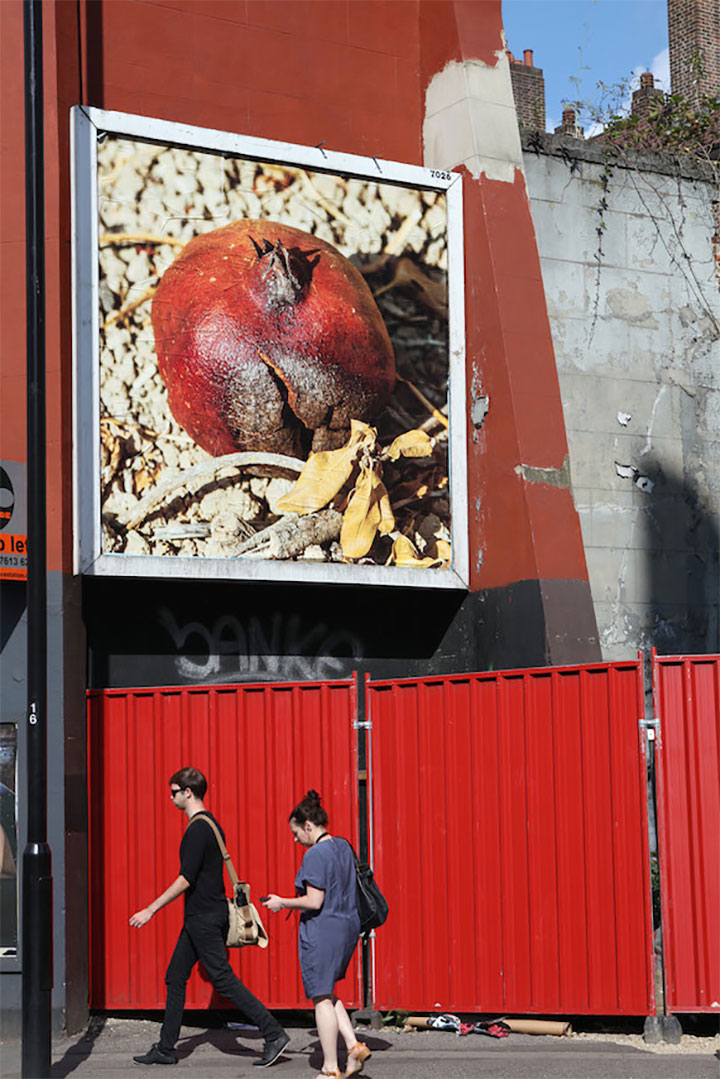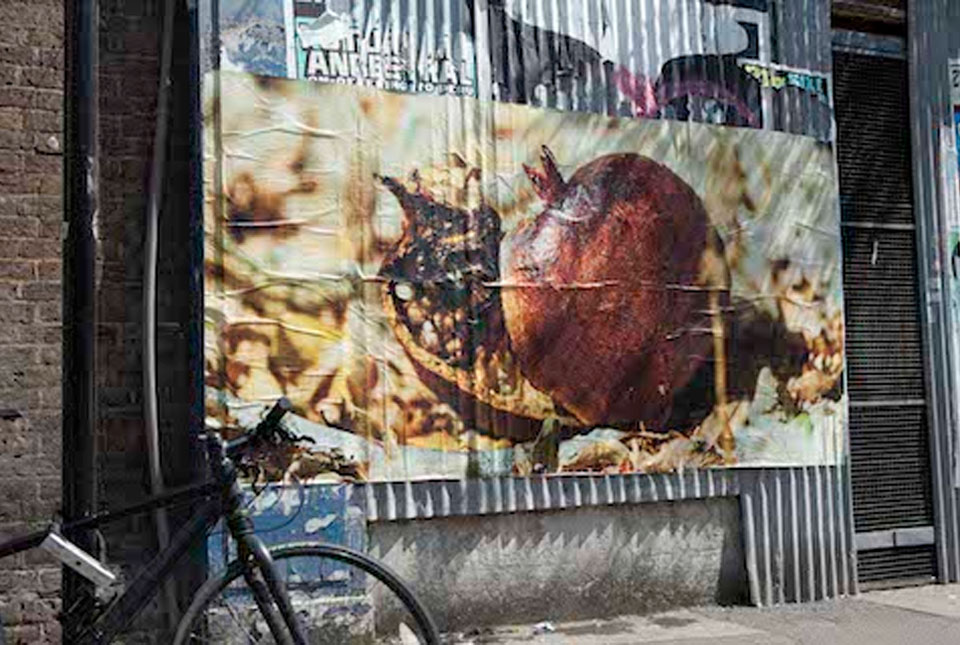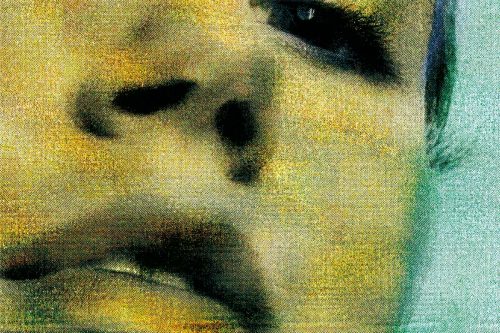Your Space Or Mine
Mustafa Hulusi: Geo-Politics of Rotting Flesh
In a part of London where I grew up pedestrians had not only to contend with street traders’ discards but there was also a regular horse and livestock market with dealers trotting their beasts up and down the High Road presenting further dangers underfoot.
At first sight Mustafa Hulusi’s recent work Pomegranate (2014) appearing on hoardings around East London, strikes a nostalgic note. To feel a clump of rotting fruit caught between heel and sole, causing that awkward public leg hobble or, if really unfortunate, a slithering pratfall was once not an altogether uncommon experience.
These days, with London’s more sanitised, regulated urbanism (and all those plastic bowls I suppose), ground-level flora is a much less common squelch. You could even be forgiven for thinking we live in a cleaner, safer city. Well, perhaps we do but Hulusi’s sumptuous and cloying images of mythical putrescence suggest this isn’t everyone’s experience. Elsewhere humankind, Hulusi would argue Humanism and perhaps the Enlightenment project itself, is drowning in rottenness.
The global food industry systematically ensures 30 to 40% of all food grown in the world is thrown away as waste in order to ‘stabilize’ prices and therefore profits.
I met the artist in Hoxton and over a suitably twatish pomegranate cocktail we chatted about his billboard project. Hulusi talks persuasively of the links between outdoor advertising or more specifically posters on hoardings, his chosen medium and the subject of his current project. Not just in terms of waste generated but that of a geographical media being subsumed by the digitalisation of the 21st century. A shift from collective to individualised communication and also how this affords advertisers a more coercive and insidious sales tool. A necrosis bound up with Neo-Liberalism and Capitalism.
The poster as rotting fruit and vice versa is an anti-‘always switched on’ gesture, maybe melancholic like Turner’s ‘The Fighting Temeraire’, signifying the ending of one age and the beginning of another.
More specifically, gigantic and incongruous mememto mori, these are Cypriot pomegranates slumping and spoiling. We can smell almost, the airless funk, witness the tragic irreversibility of decay. The artist cites parallels between a decadent state, an island divided where both sides are ruled by elites propped up by warring world interests, and a perpetual war being the adjunct of Capital’s myopic conceit: that the only way ahead is ever increased production and consumption.
Across the globe and in the streets of one of the world’s richest cities, there is the sickening stench of tax avoidance, of profits benefiting only those at the very top of the tree. Hulusi argues this image, a gift moldering, references a waste of human potential, cipher for Capitalism’s boot pressed firmly on the face of the world’s poor. This might not be an obvious reading, for many passers-by in East London it’s not an uncommon experience. While economic austerity spurs on UKIP’s fetid, dangerous and popularist banalities, a moribund, craven Socialism as peddled by new Old (just as bad as the old New) Labour offers very little in the way of a credible response to the Lib Con diet of making sure the rich keep an ever tightening hold on the fruits of other people’s toil.
As an art lecturer I am impressed when a creative person realises a work that seeks to inject some hope into the cityscape. If optimism isn’t the prerogative of the young then surely we’re lost. I am less enamoured of a new breed of up and coming artists who peddle the illusion of a rising communitarianism from the safety of a privileged bubble, be it fashion / artworld crossovers or corporate / artworld collaborations. It seems there’s even a few who would have us believe that optimism is a duty. Are they blind or do they just have a trust fund?
In this photographic reminder of transience and fragility, I would argue Hulusi’s thinking has taken a significant turn. He is no longer, as with a previous series, singing the praises of The Joyous, Wonderful and Shining Age. And, to be honest, whilst they were lush, striking paintings, if the title of that series didn’t contain any hint of irony I always thought they could be mistaken for utopian-realist agit prop. With Pomegranate, whilst there is still a beauty of sorts, Hulusi’s fallen fruit sits in grey dusty soil resembling the contents of a funereal urn. A gift of the earth has been neglected, left to rot. A situation that currently chimes with peoples the world over.
04.03.15
Words by


